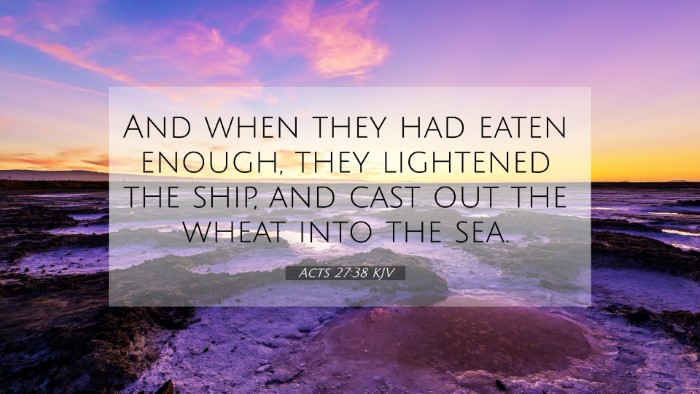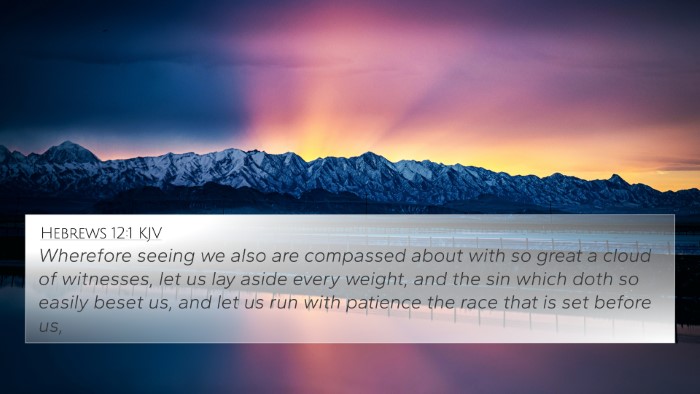Acts 27:38 Interpretation and Meaning
Acts 27:38 states: "And when they had eaten enough, they lightened the ship, and cast out the wheat into the sea." This verse comes from an event described in the Book of Acts, where Paul is on a voyage to Rome as a prisoner. Understanding this verse requires a deeper insight into its context, themes, and connections with other scripture.
Contextual Overview
In order to grasp the full significance of Acts 27:38, one must consider the broader narrative of Paul's journey, which includes challenges such as shipwreck, faith, and God’s providential care. Paul, despite being a prisoner, is portrayed as a figure of calm and guidance during a perilous situation for all aboard the ship.
Verse Breakdown
- Eating Enough: This phrase suggests a moment of physical sustenance amidst the turmoil, indicating a temporary reprieve.
- Lightened the Ship: This act symbolizes taking practical steps in dire circumstances, a necessary response to ensure survival.
- Cast out the Wheat: The decision to throw overboard precious cargo—wheat—reflects the urgency of their situation and a prioritization of life over material goods.
Biblical Principles
This verse highlights several important biblical principles:
- Faith and Dependence on God: Paul’s leadership is evident as he encourages the crew to trust in God's plan despite the storm.
- Practical Wisdom: Making tough decisions in the face of danger is a recurring theme in scripture, illustrating the need for wisdom in crisis.
- Detachment from Materialism: The willingness to sacrifice material possessions for survival resonates with Jesus' teachings on wealth and dependency on God.
Cross-References and Connections
Acts 27:38 is rich with connections that enhance understanding. Below are several verses that relate to the themes presented in Acts 27:38:
- Matthew 6:25-34: A reminder of not being anxious about material needs, highlighting faith over worry.
- Philippians 4:19: Assurance that God provides for our needs, reflecting God’s care during hardships.
- Romans 8:28: God's sovereignty in all situations, assuring believers that all things work together for good.
- 1 Peter 5:7: Casting our cares upon Him, which parallels the physical act of throwing wheat overboard.
- John 6:12: Gathering leftovers after feeding the 5,000, which reflects on the importance of resource management.
- Acts 27:23-24: Paul’s reassurance from God, which helps frame the significance of his leadership during the crisis.
- James 1:5: The wisdom we should seek in trials, reflecting the necessity of divine guidance in our decisions.
Interpretive Insights from Commentaries
Various public domain commentaries offer rich insights that deepen the understanding of Acts 27:38:
- Matthew Henry: This passage teaches believers about the importance of faith and leadership in critical moments. The act of throwing cargo overboard also serves as a metaphor for trusting God in the face of loss.
- Albert Barnes: Emphasizes the practicality of Paul's advice and the necessity of taking decisive action during trials. He connects this decision to the larger narrative of God's deliverance of His servants.
- Adam Clarke: Discusses the significance of the act of casting out wheat, interpreting it as a symbol of sacrifice for the sake of survival and a practical lesson for believers in distress.
Thematic Connections
The themes embedded in Acts 27:38 resonate through various parts of the Bible:
- Trust in Divine Providence: The narrative consistently emphasizes trust in God through trials (Proverbs 3:5-6).
- Sacrificial Living: The sacrifice of material goods for greater good can be related back to Jesus' teachings (Mark 8:36).
- Community in Crisis: The communal dimension of Acts illustrates the importance of unity and mutual support during despair (Galatians 6:2).
Practical Applications
Based on Acts 27:38, several practical applications can be made:
- Evaluating Priorities: Believers should consider what 'cargo' in their lives might need to be relinquished in order to follow God’s call.
- Emphasizing Unity: In communities facing challenges, fostering a sense of unity and collective action can lead to better outcomes.
- Practicing Faith Under Pressure: Just as Paul demonstrated faith and leadership, individuals are encouraged to embody these traits in their own lives.
Conclusion
Acts 27:38 serves as a powerful reminder of how faith, wisdom, and community can intersect in challenging circumstances. By understanding the surrounding context, the connections to other scriptures, and the insights offered by esteemed biblical scholars, one can gain a more profound appreciation for the depths of this passage. Whether you're seeking to understand how this verse relates to your own life or looking for deeper insights on the dynamics of faith and fellowship, Acts 27:38 provides valuable lessons for all believers.
SEO Keywords Summary
This content employs several relevant keywords enabling better visibility such as bible verse cross-references, connections between bible verses, bible cross-reference guide, and bible verses that relate to each other, assisting in the facilitation of a comprehensive bible cross-reference study.








